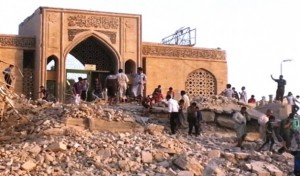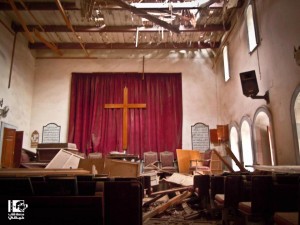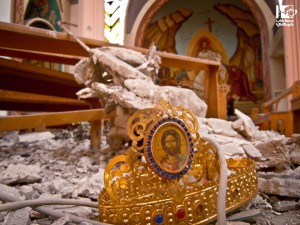A call to forgive by Huda Kandalaft
Spirited Reflection — Sunday, January 25, 2015
Huda Kandalaft is the Director of Christian Development at St. Andrew’s Presbyterian Church in Ottawa.
Jonah 3:1-5, 10; Psalm 62:5-12; 1 Corinthians 7:29-31; Mark 1:14-20
The word of the Lord came to Jonah: “Arise and go to Nineveh, that great city and cry against it; for their wickedness has come up against me” (Jonah 1:2). But Jonah does not want to go. Why? Is it because Nineveh was a chief Assyrian city, a foreign, Gentile city? Was he afraid?
Whatever the reason, Jonah heads the other direction: toward Tarshish, on the other side of the Mediterranean. But the Lord hurled a great wind upon the sea and the ship threatened to break up.
And “the Lord appointed a great fish to swallow up Jonah” (1:17). But Jonah called to the Lord out of his distress, and God answered him (2:2), and the fish spit him out on dry land (2:10).
“Then the word of the Lord came to Jonah a second time saying, ‘Arise, go to Nineveh that great city, and proclaim to it the message that I tell you'”.
As I write, Christians around the world just celebrated Christmas and New Year and some eastern Christians celebrated Christmas on Jan. 6 but many in Iraq and Syria are very worried and anxious about the escalating violence. The humanitarian situation is devastating: Tens of thousands killed and wounded, including many women and children. There are hundreds of thousands of displaced Syrians within their own country; hundreds of thousands of refugees in neighbouring Turkey, Jordan, and Lebanon. In addition to extreme shortage of food, fuel, electricity and medical care in many cities and towns, the cost of the basic needs are triple what it used to be before the revolution. It is indeed very difficult to celebrate Christmas in such a situation. Yet paradoxically, this situation in Syria and the whole Near East area today is very similar to that of the time of Jesus. Jesus was born in a country that was occupied by a foreign power, the economic situation was hard; religious freedom was heavily restricted; the political regime was repressive; those who spoke truth to power were beheaded; religious zealots were everywhere, the birth of Jesus itself was ‘ observed’ by a massacre of babes and infants, and he and his family were displaced to another country!
The president of the Near East School of Theology in Beirut, Lebanon Dr. George Sabra wrote: “We are not just geographically in the region where Christ was born and died; we are also living under the same uncertain turbulent, insecure, unpredictable, and precarious situation”.
This is how Christians in the Middle East felt this year during Christmas. Some Christian children in Iraq were beheaded because they confessed that they love Jesus and follow Him.
The Nineveh plains had the largest population of Christians in Iraq but ISIS forces took over the city Mosul, near the site of the ancient Assyrian city Nineveh, and told Christians that they either had to convert to Islam or face death by the sword. Today Mosul is emptied of its Christians who have been there for centuries.
The population of my home country Syria is an estimated 22.5 million. Christians used to make about 8% of the population four years ago. Today this number is much less. Many churches have been destroyed including the Presbyterian church in Homs, where I grew up and ministered, which was bombed on Easter Sunday 2012, and the Presbyterian Church in Aleppo which was bombed last fall, and a first century Syriac Orthodox church in Homs (built in the year 54 AD).
Today Syria and Iraq are passing through one of the darkest times of their history if not the darkest. It is a humanitarian disaster. It is hard for me to forgive…I find myself running away from the thought of forgiving when I see pictures of suffering people.
Jonah did not want to go to Nineveh because he knew God would have mercy on his enemies. He did not want their repentance; he wanted their doom. Quite contrary to the spirit of Jesus, he did not have good will toward his enemies. He did not have forgiveness in his heart.
In the midst of the disaster, I am always reminded to listen to God’s call. We are called to show forgiveness and mercy even towards our enemies. As we begin this year 2015, listen to God’s call to you and begin with forgiveness. Only with forgiveness will our world will be closer to the Kingdom of God. After all, Jesus pronounced forgiveness to his killer from the cross showing us the way to the Kingdom.
This past Christmas 2014, the Middle East was covered with a white blanket of snow; a rare event in a Middle Eastern climate. The cold weather is adding to the plight of the people, but Christians are wondering if this is a reminder from God that even in dark days such as these there is a room for joy.






